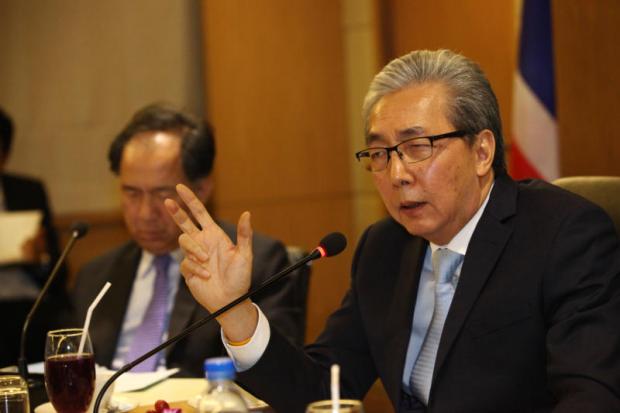
A package to clear the informal debts of almost four million poor farmers has been promised by Deputy Prime Minister Somkid Jatusripitak as part of the government's "New Year gifts to the people".
Mr Somkid yesterday instructed the ministries of Agriculture and Cooperatives, Commerce, Interior and the Bank for Agriculture and Agricultural Cooperatives (BAAC) to cooperate in introducing a comprehensive package to solve the debts of the farmers within two weeks so that it can be introduced by the end of the year.
The package will allow 3.96 million farmers who number among the 11.4 million people registered as poor to receive state welfare and financial support via the welfare card scheme.
Speaking during a visit to the Agriculture and Cooperatives Ministry yesterday, Mr Somkid said farmers make up the majority of the population, so the ministries and agencies concerned must join hands to help them.
"The assistance package has to be comprehensive, including solutions to individual debt as well as career rehabilitation, and the government will announce it as a New Year gift for farmers," he said.
According to Mr Somkid, the government will use the mechanisms of the bank and local officials under the Interior Ministry to survey the debts of low-income earners, while the government will later implement career rehabilitation and a debt-solution plan.
In the short term, the government will implement a "clinic for the poor" to help low-income earners raise their income levels while their informal debts will be transferred to the BAAC. Farmers who have debt in the formal sector will have it restructured by the bank.
In dealing with plunging farm product prices, he said, relevant agencies must work together, particularly the Agriculture and Commerce ministries, to connect production and marketing more efficiently.
However, he said any measures to be introduced to solve farm product price problems must not distort market mechanisms.
State agencies are also required to work closely with the private sector in dealing with the problem, he added.
"Everything must be better and those plans must be completed within three months. We need to carefully study the records of poor farmers to arrange a proper plan with a direct target," said Mr Somkid.
"I am here not to interfere in your work but to solve the problems of farmers who are 'small people' in this country," he said.
Prime Minister Prayut Chan-o-cha authorised Mr Somkid to supervise all economic agencies, including the ministries of Agriculture, Commerce, Tourism, Transport, Industry, Science and Technology, Finance and Foreign Affairs, the Board of Investment, the National Economic and Social Development Board and the Tourism Authority of Thailand.
"I was authorised to supervise many agencies in order to facilitate better integration at all levels," he told officials at the Agriculture Ministry.
The drop in farm commodity prices has put the government under pressure recently.
Before the cabinet reshuffle, then agriculture minister Gen Chatchai Sarikulya said he did not understand why his ministry was blamed for the slump in farm product prices as that was the responsibility of the Commerce Ministry.
Gen Chatchai was removed from the agriculture post in the latest reshuffle and became a deputy prime minister.
Rubber and palm oil farmers are among those who have born the brunt of falling prices.
Rubber farmers previously threatened to gather in Bangkok to petition the government over the problem but their leaders were arrested prior to the protest.
Deputy Agriculture and Cooperatives Minister Luck Wajananawat said the ministry will spend two weeks setting up the plan to help farmers.
"We expect that a career rehabilitation plan for those 3.96 million farmer will be finished in three to five years and it will be a model for the government to solve problems of other low-income earners," he said.
"Poor farmers do not need to come to the ministry. We will come out and find you with plans to help," he said.
Agriculture Minister Grisada Boonrach said the tier 3 rubber sheet price is now up to 47 baht per kilogramme, close to farmers' break-even level of 51 baht, excluding land costs.
The break-even point when including the cost of land is 63 baht per kg.
He said the ministry will encourage the private sector to buy rubber from farmers and accelerate their exports to release supply from the local market.
In addition, the Transport Ministry has said that it will increase its purchases of rubber milk to build roads from 33,000 to 50,000-80,000 tonnes.
The Rubber Authority of Thailand will use its existing budget of 1.2 billion baht to purchase supplies for the road projects.
The government has also ordered state agencies to use more natural rubber, targeting 100,000 tonnes to be utilised within three months.
The measures are intended to help shore up rubber prices so that hopefully they reach the critical break-even point required by Thai farmers, said Mr Grisada.